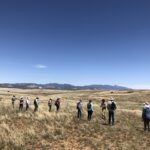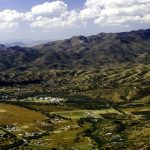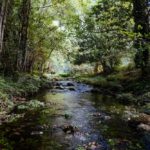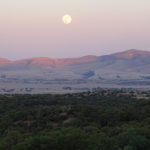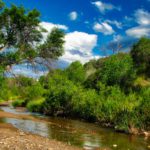
Oct 26, 2015 | Blog
Environmental Cleanup Actions
The United States Department of Agriculture Forest Service begins this month an environmental cleanup of the Lead Queen Abandoned Mine (Site) situated within the Harshaw Creek watershed. The Site is located approximately six miles south of Patagonia, Arizona, within the Sierra Vista Ranger District of the Coronado National Forest and is only accessed by 4×4 or high clearance vehicles.
The objective of this cleanup is to reduce or eliminate the downstream movement of waste rock containing elevated concentrations of arsenic, lead, and other heavy metals, as well as acid mine drainage to Harshaw Creek.
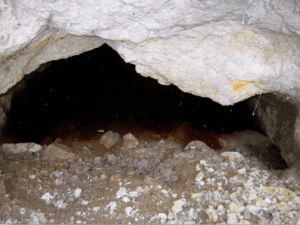
Lead Queen Adit
Past mining activities left behind abandoned horizontal openings (adits) and vertical openings (shafts), and littered the landscape with waste rock material.
The Forest Service hired an environmental firm to perform the cleanup and work should be completed by mid-February 2016. Environmental Cost Management, Inc (ECM) from California was hired for the amount of $361,689.58 of taxpayers’ money to clean up the abandoned mine site on public land.
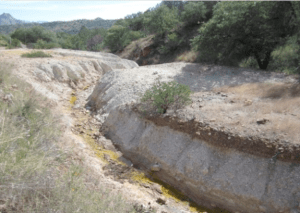
Lead Queen waste rock
The cleanup involves construction activities using heavy equipment to consolidate waste rock into a single underground contained area, cap the waste rock with native soil, and seal 4 of 6 mine openings such as adits and shafts. Polyurethane Foam (PUF) will be used to seal two adits and two shafts. The final PUF face will be covered with clean local soil and rock to prevent UV light degradation of the foam. The other two mine openings will be closed using bat-friendly gates.
In some areas of the Site, adits and shafts serve as conduits carrying large amounts of tunnel water which potentially cause floods in the downstream channels. Storm runoff carries concentrations of heavy metals stored in these adits and shafts on the surface.
Scope of Work
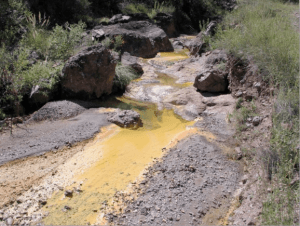
Lead Queen toxic, heavy metal drainage
The Site Cleanup will consist of excavating waste rock, hauling and placing waste rock material in a consolidation area, constructing a series of gabion walls, improving existing road for equipment access, constructing temporary access roads to mines, closing mine features, installing bat- friendly gates, and seeding and mulching of all disturbed areas.
A series of gabion walls will mitigate the transport of aluminum precipitate and red-orange sludge and sediment downstream of the Site and into the lower reaches of the Harshaw Creek watershed. These gabion walls will be installed in the drainage bottom at various locations downstream of the Site.
CERCLA Time Critical Action Removal Action
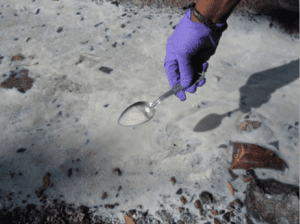
Sampling at Lead Queen mine site
The Forest Service is exercising its authority under the Comprehensive Environmental Response, Compensation, and Liability Act (CERCLA; 42 U.S.C. 9601 et seq.) to conduct the cleanup activities at the Site. The Time Critical Removal Action Approval Memorandum documents and explains the commencement of a CERCLA Removal Action at the Site. The Forest Service’s role is to protect the public health and welfare and the environment and to respond to a hazardous substance release on lands under the jurisdiction of the Forest Service, pursuant to the authority found in 42 U.S.C. 9604(a), Executive Order 12580, and 7 C.F.R. 2.60(a)(39).
Public Information
For additional information about the cleanup, please contact:
Eli Curiel Jr., P.E.,
Project On-Scene Coordinator
USDA Forest Service
Coronado National Forest
300 West Congress Street Tucson, AZ 85701
(520) 388-8413
Monday-Friday, 9:00 AM – 4:30 PM

Related links:
Forest Service Outlines Clean Up Plans for Abandoned Lead Queen Mine https://www.patagoniaalliance.org/forest-service-outlines-clean-up-plans-for-abandoned-lead-queen-mine/
Video: Leaking Historic Patagonia, Arizona Mines https://youtu.be/uEgaFhT5RXw
The U.S. Department of Agriculture (USDA) prohibits discrimination in all its programs and activities on the basis of race, color, national origin, age, disability, and where applicable, sex, marital status, familial status, parental status, religion, sexual orientation, genetic information, political beliefs, reprisal, or because all or part of an individual’s income is derived from any public assistance program. (Not all prohibited bases apply to all programs.) Persons with disabilities who require alternative means for communication of program information (Braille, large print, audiotape, etc.) should contact USDA’s TARGET Center at (202) 720-2600 (voice and TTY). To file a complaint of discrimination, write to USDA, Director, Office of Civil Rights, 1400 Independence Avenue, SW, Washington, DC 20250-9410 or call (800) 795-3272 (voice) or (202) 720-6382 (TTY). USDA is an equal opportunity provider and employer.

Sep 16, 2015 | Blog
FOR IMMEDIATE RELEASE
Contact: Courtney Sexton, csexton@defenders.org, 202-772-0253
Wendy Russell, wendy@patagoniaalliance.org, 520-477-2308
Federal court flips the off switch on Forest Service’s approval of “Sunnyside” project in Coronado National Forest
Tucson, Ariz. —A district court in Arizona put the brakes on an environmentally destructive exploratory drilling project in the Coronado National Forest near Patagonia, Arizona, saying the Forest Service failed to conduct the appropriate environmental review before fast-tracking the approval of the “Sunnyside” project. In October 2014 conservation groups Defenders of Wildlife and the Patagonia Area Resource Alliance (PARA) filed a lawsuit claiming the Forest Service’s approval violated environmental laws and posed a threat to endangered species in the area.
Statement from Rob Peters, Defenders of Wildlife:

Pictured: Ocelot by Steve Harris
“This is a great victory for the many species of imperiled wildlife that call the Coronado National Forest and the Mountain Empire region home, especially the jaguar, Mexican spotted owl, ocelot and yellow-billed cuckoo, all of which are already at risk from multiple projects in the region.
“The court’s ruling against this destructive mining operation is the best thing that could have happened for the residents of Patagonia and for the incredible and diverse wildlife in the area.”
Statement from Wendy Russell, Patagonia Area Resource Alliance:
“We’re not going to stand by and let the Forest Service rubber-stamp these mining projects in the Patagonia Mountains. There’s too much at stake for both our community and wildlife. This is the second time we’ve had to take them to court, and the second time we’ve won.”
Defenders and PARA were assisted in the case by Roger Flynn, an attorney with the Western Mining Action Project. Flynn noted the importance of local residents’ right to participate in the Forest Service’s review of mineral projects on public land – residents were excluded from this process in the fast-tracking of the approval, a violation of federal law.
Background:
The Canadian mining company Regal Resources’ Sunnyside Project (an exploratory mining operation) involves drilling six exploratory holes for copper deposits up to 6,500 feet deep roughly five miles from the town of Patagonia, Arizona. The Forest Service issued a “categorical exclusion” decision which essentially fast-tracked the mineral drilling exploration and approved the project without involving the public or taking a hard look at the project’s impacts to endangered species. The decision authorized Regal Resources to run its drill rigs for at least five months in sensitive endangered species’ habitat. Loud mineral drilling operations and construction would occur 24 hours a day, seven days a week (using artificial lighting at night) with total project operations and reclamation lasting up to three years.
In January of this year, the Forest Service temporarily withdrew approval for the Sunnyside project until it completed consultation with the U.S. Fish and Wildlife Service to determine whether the project would significantly affect the western yellow-billed cuckoo, which is listed as a federally threatened species. After completing the consultation and concluding that there would be no significant effects, the Forest Service re-issued its approval for drilling to proceed in April, 2015.
###
Defenders of Wildlife is dedicated to the protection of all native animals and plants in their natural communities. With more than 1.2 million members and activists, Defenders of Wildlife is a leading advocate for innovative solutions to safeguard our wildlife heritage for generations to come. For more information, visit www.defenders.org and follow us on Twitter @DefendersNews.
The Patagonia Area Resource Alliance is a citizen watchdog organization that monitors the activities of mining companies, as well as ensures government agencies’ due diligence, to make sure their actions have long-term, sustainable benefits to our public lands, our water, and the town of Patagonia. For more information visit www.patagoniaalliance.org and follow us on Twitter @PARAalliance.

Jan 13, 2015 | Blog
FOR IMMEDIATE RELEASE
Plug Pulled on Proposed “Sunnyside” project in Arizona’s Coronado National Forest
Tucson, Ariz. — Today the U.S. Forest Service temporarily put the brakes on an environmentally hazardous mining project in southern Arizona’s Coronado National Forest that it previously approved in August. The Forest Service’s decision follows a similar move by the U.S. Fish and Wildlife Service, which had originally given the project the green light in August and then withdrew its approval in December. The agency decisions to withdraw their approvals of the Canadian mining company Regal Resources’ “Sunnyside Project” are based on the project’s potential violation of multiple environmental laws.

photo by Nathan Rupert
“The agencies knew from the beginning that this project could have a devastating impact on the local wildlife and habitat in this unique corner of the country,” said Rob Peters of Defenders of Wildlife. “The Coronado is home to an incredible diversity of imperiled species like the jaguar, ocelot and yellow-billed cuckoo, all which are already at risk from multiple projects in the region.”
“No one understood why they approved this project to begin with, but for the sake of Patagonia’s residents and wildlife, we are glad to see that they’ve reconsidered,” added Peters.
In October conservation groups Defenders of Wildlife and the Patagonia Area Resource Alliance filed a lawsuit claiming the federal agencies’ approvals the Sunnyside project violated environmental laws and posed a threat to endangered species and the safety of drinking water for local residents.
“Sunnyside could have been a disaster not only for our region’s unique wildlife, but also for the residents living directly downstream and the municipal watershed of the town of Patagonia,” said Wendy Russell of the Patagonia Area Resource Alliance. “Projects like Sunnyside use and abuse a tremendous amount of the local water supply and create long-term destruction of wildlife habitat. The people and wildlife of our national forests deserve more, and the agencies know that.”
Click to hear from environmental attorneys on why they sue.
###
Contact: Courtney Sexton, csexton@defenders.org, 202-772-0253
Wendy Russell, wendy@patagoniaalliance.org, 520-477-2308
Defenders of Wildlife is dedicated to the protection of all native animals and plants in their natural communities. With more than 1.1 million members and activists, Defenders of Wildlife is a leading advocate for innovative solutions to safeguard our wildlife heritage for generations to come. For more information, visit www.defenders.org and follow us on Twitter @DefendersNews.
The Patagonia Area Resource Alliance is a citizen watchdog organization that monitors the activities of mining companies, as well as ensures government agencies’ due diligence, to make sure their actions have long-term, sustainable benefits to our public lands, our water, and the town of Patagonia. For more information visit www.patagoniaalliance.org and follow us on Twitter @PARAalliance.

 United States Department of Agriculture Forest Service – Southwestern Region Coronado National Forest Arizona
United States Department of Agriculture Forest Service – Southwestern Region Coronado National Forest Arizona






